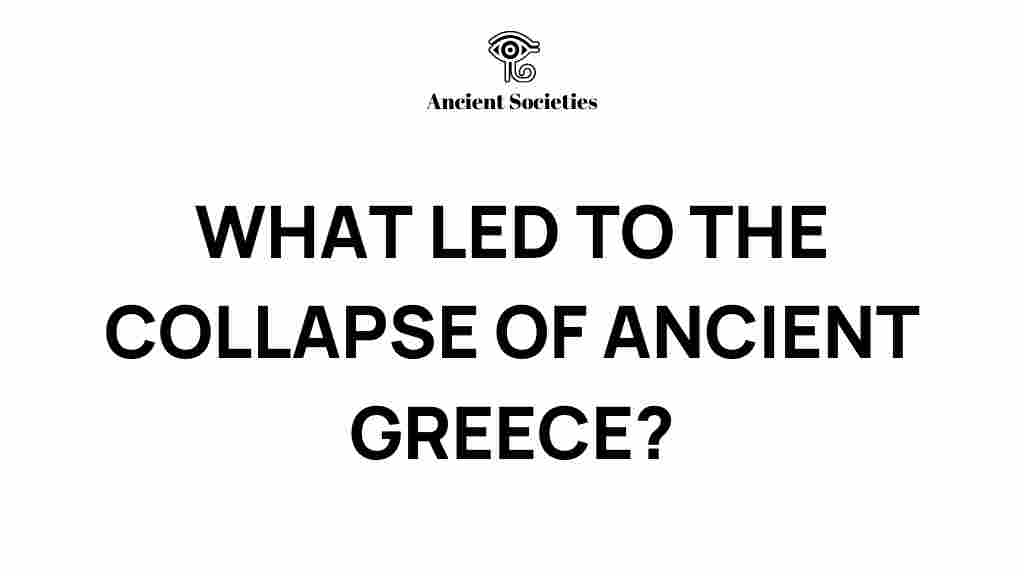Unraveling the Mysteries: What Caused Ancient Greece’s Downfall?
Ancient Greece is often hailed as the cradle of Western civilization, renowned for its remarkable contributions to art, philosophy, politics, and science. However, despite its monumental achievements, this great civilization eventually faced a significant decline that led to its downfall. Understanding the factors that contributed to this collapse is crucial for comprehending not only Ancient Greece’s history but also the patterns of societal decline in general. In this article, we will explore the multifaceted reasons behind the decline of Ancient Greece, focusing on its politics, culture, warfare, and society.
The Political Landscape of Ancient Greece
The political structure of Ancient Greece was complex and varied widely among its city-states, known as poleis. Each polis had its own government, laws, and customs, leading to a rich tapestry of political experimentation, including democracy, oligarchy, and tyranny. However, this diversity also sowed the seeds of discord and conflict.
- Fragmentation of Power: The multitude of city-states often led to rivalries and warfare, weakening collective strength.
- Corruption and Inefficiency: As some city-states experienced a decline in civic participation, corruption took root, undermining effective governance.
- Failure of Democracy: The Athenian experiment in democracy, while groundbreaking, eventually faced challenges as factions emerged, leading to instability.
These political issues created an environment ripe for conflict and division, making it difficult for Ancient Greece to respond effectively to external threats.
Cultural Decline and Its Impact
Culture is a defining feature of any civilization, and Ancient Greece was no exception. Its cultural achievements in drama, philosophy, and art were unparalleled. However, over time, cultural stagnation and shifts played a role in the decline of this civilization.
- Shift in Values: The focus on individualism and personal gain began to overshadow communal values, leading to a loss of civic pride.
- Loss of Intellectual Leadership: As key philosophers and thinkers passed away, a decline in intellectual discourse contributed to cultural stagnation.
- Invasion of New Ideas: The influx of foreign cultures, particularly from the East, sometimes diluted traditional Greek values and customs.
This cultural decline affected the cohesion and identity of Ancient Greek society, which was essential for its unity and strength.
Warfare: A Double-Edged Sword
Warfare is often seen as both a catalyst for growth and a potential contributor to decline. In the case of Ancient Greece, the numerous conflicts had far-reaching consequences.
- Peloponnesian War: The protracted conflict between Athens and Sparta (431-404 BC) drained resources, divided alliances, and shattered the fragile peace among Greek city-states.
- Military Overreach: Ambitious military campaigns, such as Alexander the Great’s conquests, while initially successful, eventually stretched resources thin and led to internal strife.
- Rise of Macedon: The unification of Greece under Macedonian rule marked the end of the classical period of direct Greek governance, signaling a shift away from traditional city-state autonomy.
The constant state of warfare ultimately left Ancient Greece vulnerable and weakened, paving the way for its decline.
Societal Changes and their Ramifications
As with any civilization, societal changes can significantly impact stability and continuity. Ancient Greece experienced notable transformations that contributed to its eventual downfall.
- Social Stratification: The widening gap between the rich and poor created social tensions and unrest, undermining the unity essential for survival.
- Decline of Civic Engagement: As citizens became disillusioned with politics, participation in public life waned, leading to a decline in democratic values.
- Population Decline: Wars, plagues, and economic difficulties led to a decrease in population, reducing the labor force and military capacity.
These societal changes eroded the very foundations of Ancient Greek civilization and contributed to its decline.
Step-by-Step Process of Decline
The decline of Ancient Greece was not a singular event but rather a gradual process influenced by various interrelated factors. Here’s a step-by-step outline of this decline:
- Political Fragmentation: Rivalries among city-states led to weakened alliances.
- Corruption and Civil Discontent: Disillusionment with political leaders and systems grew.
- Intellectual Stagnation: A decline in philosophical inquiry and artistic expression ensued.
- Prolonged Warfare: The Peloponnesian War exhausted resources and morale.
- Erosion of Social Cohesion: Social divisions and economic disparities increased.
- Invasion and Conquest: External forces, especially the Macedonians, capitalized on internal weaknesses.
This systematic decline illustrates how interconnected the various factors were, culminating in the eventual collapse of Ancient Greece as a dominant civilization.
Troubleshooting Tips for Understanding Decline
To better understand the decline of Ancient Greece, consider the following tips:
- Read Primary Sources: Ancient texts from historians like Thucydides and Xenophon provide firsthand accounts of events and sentiments during the decline.
- Study the Geography: The geography of Greece, with its mountains and seas, shaped political boundaries and influenced warfare.
- Analyze Societal Structures: Explore how social hierarchies affected political and civic life.
- Connect with Modern Analogies: Draw parallels with contemporary societies facing similar challenges to gain insights into the patterns of decline.
By utilizing these tips, you can gain a deeper understanding of the complexities and nuances surrounding the collapse of Ancient Greece.
Conclusion: Lessons from the Collapse of Ancient Greece
The decline of Ancient Greece is a poignant reminder of the fragility of civilizations. Through a combination of political discord, cultural stagnation, warfare, and societal changes, this once-great civilization faced a multifaceted collapse. Understanding these factors not only sheds light on Ancient Greece’s history but also serves as a cautionary tale for contemporary societies. As we reflect on the lessons of the past, we must consider how the interplay of politics, culture, warfare, and societal cohesion plays a crucial role in the stability and longevity of any civilization.
For more insights into the history of civilizations and their dynamics, check out this detailed analysis of societal collapses. Additionally, to explore more about Ancient Greece, you can visit this informative resource.
This article is in the category History and created by AncientSocieties Team
